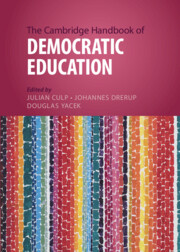Book contents
- The Cambridge Handbook of Democratic Education
- Cambridge Handbooks in Education
- The Cambridge Handbook of Democratic Education
- Copyright page
- Contents
- Contributors
- Acknowledgments
- Introduction
- Part One Historical Perspectives
- 2 Plato on Democratic Education
- 3 Aristotle on Education, Democracy, and Civic Friendship
- 4 Rousseau on Democratic Education
- 5 Dewey on Democratic Education
- 6 Hannah Arendt on the Very Possibility of Democratic Education
- 7 Paulo Freire on Democratic Education
- 8 Rabindranath Tagore on Democratic Education
- Part Two Philosophical and Normative Foundations
- Part Three Key Topics and Concepts
- Part Four Challenges
- Index
- References
2 - Plato on Democratic Education
from Part One - Historical Perspectives
Published online by Cambridge University Press: 20 April 2023
- The Cambridge Handbook of Democratic Education
- Cambridge Handbooks in Education
- The Cambridge Handbook of Democratic Education
- Copyright page
- Contents
- Contributors
- Acknowledgments
- Introduction
- Part One Historical Perspectives
- 2 Plato on Democratic Education
- 3 Aristotle on Education, Democracy, and Civic Friendship
- 4 Rousseau on Democratic Education
- 5 Dewey on Democratic Education
- 6 Hannah Arendt on the Very Possibility of Democratic Education
- 7 Paulo Freire on Democratic Education
- 8 Rabindranath Tagore on Democratic Education
- Part Two Philosophical and Normative Foundations
- Part Three Key Topics and Concepts
- Part Four Challenges
- Index
- References
Summary
In this chapter, I turn to an unlikely source for democratic inspiration: Plato’s Republic. I argue that, understood correctly, Plato’s Republic provides insights into what a flourishing democracy looks like and how education can help produce such a democracy. While Plato does not provide an explicit defense of democracy, his criticism of corrupt democracies in Book VIII and his often-ignored advocacy of egalitarian communities in Books II, III, and IV offer contemporary educators insights into a mode of education that could strengthen contemporary democracies. Once this interpretation is in place, I will discuss the ways contemporary democratic educators might use Plato’s ideas to support students in their development as democratic citizens.
- Type
- Chapter
- Information
- The Cambridge Handbook of Democratic Education , pp. 13 - 28Publisher: Cambridge University PressPrint publication year: 2023

